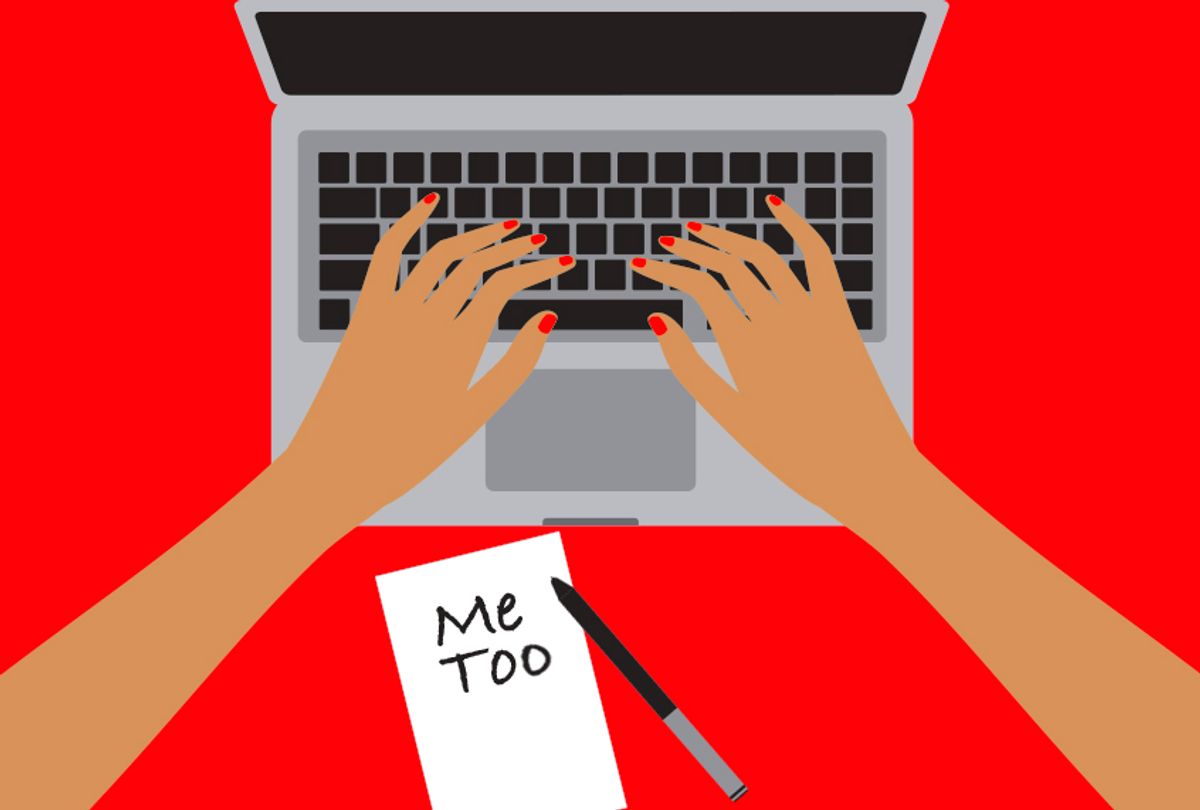They were just two small words, but in the wake of the Harvey Weinstein story, they became a deluge. And uttered in unison, they broke the illusion that our social media feeds so often adeptly create for us. They acknowledged that we are not OK here.
They were a long time in coming. Ten years ago, activist Tarana Burke first began the campaign as "a catchphrase to be used from survivor to survivor to let folks know that they were not alone." On Sunday, actress Alyssa Milano, inspired by it, tweeted the suggestion "If all the women who have been sexually harassed or assaulted wrote 'Me too' as a status, we might give people a sense of the magnitude of the problem."
Your feed likely then blew up as much as mine did. Nearly every woman I follow soon added her two words to the chorus (In the greatest of ironies, my friend Deborah Copaken posted images from a youthful photo project documenting her street harassment — and was temporarily suspended from Facebook for posting "content that threatens or promotes sexual violence or exploitation"). Some women simply posted the phrase. Others added their stories, or a litany of incidents. A few kept silent — not, I imagine, because they didn't have their own experiences — but because as one person pointed out on Twitter, "Survivors do not owe you their trauma."
The whisper network many of us have relied on nearly all our lives — and I know I'm speaking mostly of cisgender girls and women here — meant that many of us already knew each others' "me too" tales. We knew our stories of gropings on public transportation and sexual assaults in dorm rooms. We knew about the bosses we'd dutifully done our best work for while they humiliated us; the relatives whose touches were too intimate. Yet the collected impact of those experiences, pulled together into one phrase, was nevertheless profound. Some of that, no doubt, was sharing out loud and sharing it in mixed company. But as days have passed, I've noticed that it was something else as well. It just felt unusually honest.
The nature of social media inherently creates a deeply distorted picture of other people's realties. It lends itself so well to braggy one-upmanship, like your cousin's Christmas newsletter except every single day, forever. My Facebook would have me believe that everybody else just picked up another award for being the best at everything; is #blessed for having the World's Happiest Relationship; is extremely #proud and #grateful for their high achieving children who never struggle in school or act out at home, and who definitely just got back from the most scenic vacation of all time. Is it any wonder that being surrounded by so much apparent bliss is making so many of us unhappy? Offline, my friends and I console and entertain each other. Online, because nobody is Instagramming a sink full of dirty dishes or a middle of the night panic attack, I wonder if it's just me.
It's not that the awesome stuff isn't real too. I am happy for other people's triumphs (most of the time!). My family is wonderful (and difficult!). My life is fulfilling (and a hot mess!). But as that Harper's Bazaar story that every woman you know was breathlessly sharing and debating just a few weeks ago, the general expectation on women — one that we play into all the damn time ourselves — is that we will make things nice. Whether it's cleaning the toilet or smiling pleasantly while we're being grabbed by some cocky d-bag on national television, we are the problem solvers and emotional laborers. We make the ugly presentable, from sticky countertops to bad men. Because to do otherwise gets us labeled difficult and crazy. I'm fine, we say, for years on end. Everything's fine. Look how pretty.
Just a few days ago, as I was fighting back tears on the subway, I berated myself for being such an emotional wreck. But #MeToo was a signal to all of us in the just-holding-it-together club. It was a moment of vulnerability. It said, sure, we may share with the world this beautiful latte foam art but we are super angry and sad too. We have carried around the pain of what selfish, insecure creeps did to us because they felt like they could, and have carried the shame of feeling like it was our fault, and you know what? It still hurts. It hurts to read in the news what other women have endured, and what abusive men have gotten away with for decades. It hurts to see other cruel men still being rewarded in plain sight.
Does #MeToo fix anything? Does it change anything? Does it further the radical notion that maybe the onus of preventing harassment and assault shouldn't be on the victims of it? I aim for hopeful, but still land on doubtful. I'm glad for it anyway. At least for a moment, a great number of us could find a measure of comfort in not smiling bravely for once. In saying together, "Are you finding all of this, day in and day out, so, so unbelievably hard?" Yeah. Me too. It's not your typical status update. It's not an OMG, look where I am! selfie moment. It's just one big, long, loud, cathartic howl. And when we howl together, it sounds like music.



Shares